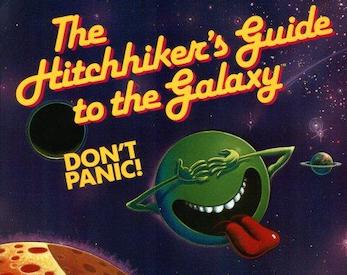
The Hitchhiker's Guide to the Grams















Published on 18 April 2024 by Andrew Owen (3 minutes)
Douglas Adams’ “The Hitchhiker’s Guide to the Galaxy” is best known as a trilogy in five parts (with a sixth by Eoin Colfer). But before the books came the radio play. And the album; recorded to avoid the rights issues with all the music used in the first radio series. After that, the BBC learned its lesson… until Dirk Maggs adapted the books for radio and had Marvin the Paranoid Android hum Pink Floyd.
“I wanted Hitchhiker’s to sound like a rock album. I wanted the voices and the effects and the music to be so seamlessly orchestrated as to create a coherent picture of a whole other world – and I said this and many similar sorts of things and waved my hands around a lot, while people nodded patiently and said ‘Yes, Douglas, but what’s it actually about?’” —Douglas Adams
A list of “grams” (radio jargon for music sources) is included in “The Original Hitchhiker’s Guide to the Galaxy Radio Scripts”. But you can’t listen to that, and in any case it doesn’t include full album details. I don’t use Spotify (reasons possibly worth their own article at a later date) and some of these tracks probably aren’t there in any case. So here then are a collection of commercially licensed sources.
Journey of the Sorcerer, the theme tune, was composed by Bernie Leadon who allegedly left The Eagles because bandmates Glenn Fry and Don Henley didn’t want to include it on the album. Adams wanted a theme with an electric banjo. Many Hitchhiker’s fans who inquired where they could obtain the theme were surprised to discover they already owned a copy of the album. I’m speculating, but I think perhaps Adams first encountered Hungarian composer Ligeti’s work (Requiem) in the soundtrack to “2001: A Space Odyssey” and wanted something similar for Hitchhiker’s. The rest of the music choices are mostly progressive rock and early electronica. In a way, it’s a snapshot of what was in rotation in Adams’ record collection in 1978.
This might be a short article, but it took a long time to track down the various albums and, until someone cites this article, you won’t find them on Wikipedia (which they really should have called the Encyclopedia Galactica). Share and enjoy!